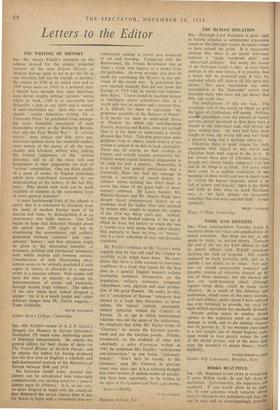WORK AND DENT1StS
SIR,—Your correspondent Dorothy Smith is sceptical about the value and practicability of dental assistants. But these are not, .as she ry
seems to imply, an untried theory. Towards the end of the war the RAF diluted its -staff of dental officers' with WAAF assistants Carrying the rank of sergeant. The system appeared to work perfectly well, and as a patient I can testify to its value. Not only was my mouth competdntly inspected and possible sources ,of infection cleaned up by one of these assistants, but she showed me how my tooth-brushing ritual, although regular twice daily, could be made more effective. As a result of this attention and instruction, which none of the many dentists, civil and military, under whom I have suffered has ever bothered to provide, my need for their skilled operations has markedly declined. Present policy seems to confine dental service to the expensive work of repairing damage to teeth, and to do nothing whatso- ever to prevent it. If my wartime experience is a fair sample, use of dental hygiene assis- tants would in time greatly reduce the cost of the dental service, and at the same time raise the standard of dental fitness.- .Yours faithfully,
EX-SQUADRON-I i:ADIIR Elstree Hill Laboratory, Bromley, Kent










































 Previous page
Previous page